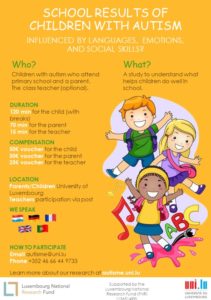Autistic children tend to perform worse at school than their abilities would suggest. Why is this the case? What can we do about it? The ASA project aims to answer these questions.
ACADEMIC SUCCESS
How can emotions and multilingualism influence the academic success of children with autism?
The project is led by Dr. Andreia Costa and M.Sc. Maïte Franco of the Institute for Health and Behaviour in the Department of Behavioural and Cognitive Sciences and funded by the Fonds National de la Recherche (FNR).
AN EDUCATIONAL ISSUE WITH LIFELONG CONSEQUENCES
The aim of every education department is to enable all children to reach their full potential and to succeed in school. However, educational success is determined by many individual and socio-economic factors that are difficult to control, and some children end up achieving less than their abilities would predict. Many of these cases are children on the spectrum.
Autistic children, especially those with average or above-average IQs, often perform below what is expected based on their cognitive abilities. The consequences of this can be lower grades, frequent school transfers, exclusion from school, redirection to special schools and dropping out of school. These phenomena have consequences for the child’s well-being and have repercussions in adolescence and adulthood. The educational underachievement of autistic children is therefore a societal challenge that must be addressed.

POSSIBLE WAYS TO ADDRESS THE PROBLEM
Although this is an issue for many families of autistic children, there is little scientific research on the subject and the reasons why autistic children perform worse at school remain unclear. This could be due to external factors such as educational practices and the educational system, or as well individual factors such as the child’s social-emotional difficulties. Research with neurotypical children shows that children who use maladaptive emotional regulation strategies have greater difficulty in assimilating and remembering new information which results in poorer academic performance. Given that autistic children often have emotional problems in the school setting and use maladaptive emotional regulation strategies more often than neurotypical children, this could explain their unexpected academic performance.
Furthermore, language and cognitive processes are interconnected, and emotions can foster this relationship. Therefore, the language in which multilingual children express their emotions may have an impact on their cognitive abilities such as attention and memory.
LUXEMBOURG, AN IDEAL PLATFORM
Luxembourg’s multilingual context makes it an ideal platform to understand the potential effects of emotions and language on children’s cognitive and academic performance.
The aim of the ASA project is therefore to understand how emotional difficulties and multilingualism may influence the cognitive abilities and academic performance of autistic children. The results of the ASA project will provide a better understanding of the factors that affect the unexpected academic performance of autistic children and identify strategies to address them.
PROJECT
The ASA project is a collaboration between the Departement of Behavioral and Cognitive Sciences and the Departement of Human Sciences of the University of Luxembourg and the Laboratory of Psychophysiology of Stanford University.
The ASA project is funded by the Fonds National de la Recherche du Luxembourg (FNR – 13651499). The project will rum from 2020 to 2023 with a funding of 397.000€.
CONTACT
For more information about this study or to participate, please contact us at autisme@uni.lu.
NEWSLETTER
SUBSCRIBE FOR NEWS AND INVITATIONS TO PARTITIPATE IN STUDIES








